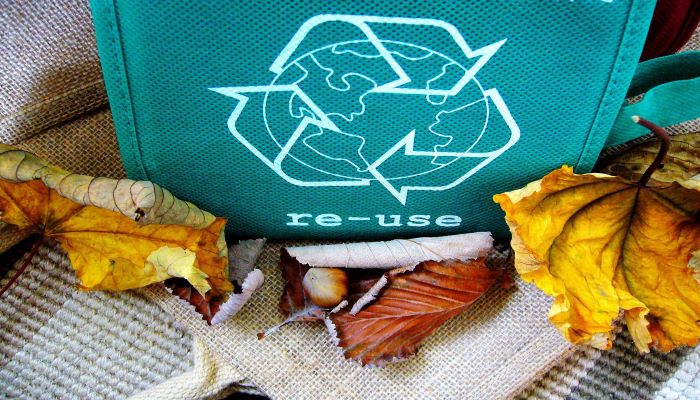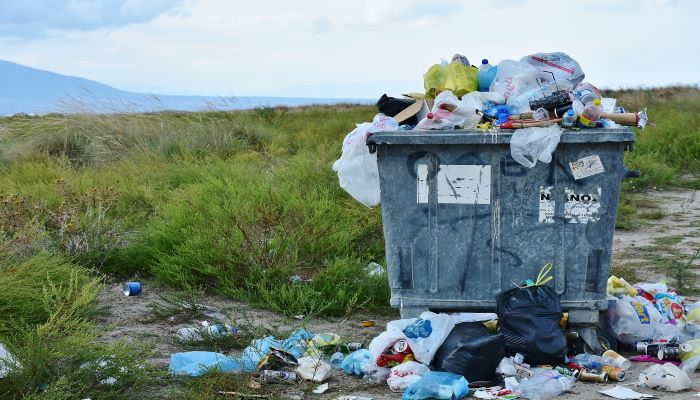The new decade is upon us, and many of us have the same goal in mind: to be more eco-friendly. Living a more sustainable lifestyle can be very rewarding – but also a bit daunting. Thankfully there are four easy-to-follow stepping stones that we can apply to everyday life: reduce, reuse, recycle and repurpose.
Reduce
The first step to this eco-friendly quartet is to reduce, which seems self-explanatory – just use less. Each year, we use 1 billion plastic shopping bags, creating 300,000 tons of landfill waste?1 You can start reducing your use of plastic by:
- Bringing reusable bags to the grocery store and buying in bulk whenever you can,
- Using a washcloth instead of a paper towel when cleaning up kitchen messes,
- Taking shorter showers,
- Hand washing dishes instead of using the dishwasher,
- And avoiding single-use plastics (plates, bowls, cups, Styrofoam, straws, water bottles, etc.)
Whether you’re reducing your waste, your water usage or your buying habits, a little effort goes a long way for the environment.
Reuse
Next up to bat is reuse, which is as simple as it sounds. When you reuse products, you’re able to make use of them multiple times or in multiple ways. In less than 15 years, worldwide waste is expected to double.2 So, instead of throwing away, find a way to reuse items you would otherwise toss! Some super simple ways to reuse what you already have and keep trash out of landfills are:
- Purchase a reusable water bottle instead of using single-use plastic bottles.
- Use your old toothbrush to scrub small, hard to reach areas when cleaning the house.
- Turn your empty coffee tin into a storage container for your household items.
- Pop your used tea bags in the fridge then place on eyes for a natural eye de-puffer.
- Turn a broken frame into an earrings holder by attaching wire across frame and hanging earrings from wire.
- Cut the top off of an old soda bottle and hang it from a tree with birdseed for an easy bird feeder.
There are endless ways to reuse items that would typically be going to waste, but the best way you will be successful with this step is to be CREATIVE!
Recycle
The third “R” on our list, recycling, is the process of turning waste into new materials or objects. In some cases, producing waste is inevitable. However, it is important to be aware of the waste you are producing and how to recycle as much of that waste as possible. For example:
- If you have to use a plastic spoon, clean it thoroughly and make sure it is recycled.
- Find a local recycling center to recycle old electronics or furniture.
- If you can’t find a use for old plastic or glass bottles and jars, give them a rinse and make sure they end up in the recycling bin.
It is important to produce as little waste as possible, but when you do produce waste, determine how much of it can actually be recycled, clean it off and throw it in the recycling bin.
Repurpose
Perhaps the most creative of the four R’s is to repurpose by taking a product you don’t use or haven’t used in a while and giving it a new life somewhere else. Here are a few of our favorite ways to repurpose items commonly thrown away that could be used for another job:
- Have an old t-shirt? Instead of throwing it away, cut it up into squares or rectangles and BOOM, you’ve got yourself new wash rags.
- Have an empty milk carton? Poke holes in the top of the cap and you’ve got yourself a DIY watering can.
- If you have any old jewelry, remove it from its base and hot glue a magnet to the back for new and improved fridge magnets.
- Reinvent your old CDs into cool coasters for your coffee table.
There are so many ways to repurpose items around your house, it just takes a little bit of creativity (and a little help from the internet) to perfect any DIY repurposing project.
If you start implementing the four R’s into your everyday life, the difference you will have on the environment will become exponential. Once you’ve perfected them, start sharing them with your friends and showing them all the ways they can easily reduce, reuse, recycle and repurpose. Who knows, maybe you’ll pick up some new tips along the way!
For more information related to environment & sustainability, follow us on Facebook, LinkedIn and Twitter.
-Chariot Energy

